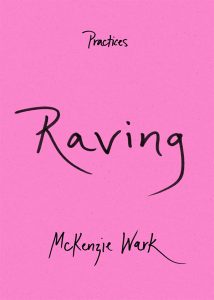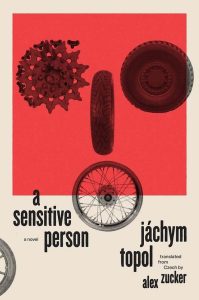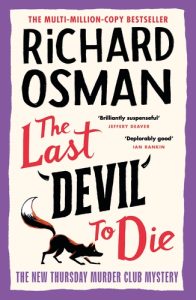Books
Mothers
The thing about becoming a transsexual is that most of us can’t draw on much of a transsexual culture. We have to sort out ways to be by cutting and pasting from the cultural materials that are around us. Which is not what we were supposed to make of those things. We’re not who we were expected to become....
The Best Books We Read in 2023
Before reading this novel, I’d somehow missed that Shakespeare had a child named Hamnet, who died of the plague in 1596 at the age of eleven, four years before Hamlet was written. Seems relevant! Only the bare bones are known about Shakespeare’s wife, Agnes/Anne, and their kids, and Hamnet is O’Farrell’s lyrical recreation of their 16th century family life in Stratford-upon-Avon.
‘The Age of Insurrection: The Radical Right’s Assault on American Democracy’ Explains How We Got Here — And What Comes Next
“As far as I’m concerned, I’m done with this,” investigative reporter David Neiwert told us,...
Pop-Culture Angels Are More Than Just Embarrassing Kitsch
Cloying sentimentality, saccharine pablum, ridiculous camp and embarrassing kitsch—in the contemporary moment the word “angel”...
How a Puritan Society invented Modern Currency and a Monetary Committee
by Dror Goldberg* Where and when did modern currency originate? My book Easy Money: American Puritans and the Invention of Modern Currency (University of Chicago Press, 2023) tackles this fascinating question. I discover and explain the origin of modern currency in 1690 in the English colony of Massachusetts Bay — an unimportant place, compared to […]
Philosophy You Liked Published in 2023
The year is coming to a close, and so it’s a good time for year-end lists, and Daily Nous is a good place for a year-end list about good philosophy.

I’m not asking you about “the best” new philosophy you read. The idea that we could make such fine-grained comparisons of philosophical quality is doubtful. Plus, it puts too much pressure on people answering, making the exercise less fun.
So let’s keep it relaxed and low stakes. Of the philosophy you read—articles, chapters, or books—published in 2023, which did you like and would recommend others read?
When answering, please follow these guidelines:
- just one or two suggestions each, please
- don’t recommend your own writing
- the works you suggest should have 2023 publication dates
- add a line or two saying what you liked about each work you mention
- include links to the works, if possible
- use your real name (at least your first name) and a verifiable email address (your email address won’t be published)
I’m looking forward to seeing your suggestions.
Posting will be light over the next week.
The post Philosophy You Liked Published in 2023 first appeared on Daily Nous.
Eight of the best books of 2023, recommended by LSE blog editors
LSE blogs regularly feature book reviews of the latest publications from across the social sciences and humanities. But which books were LSE blog editors gripped by in 2023? In this list, five LSE blog editors recommend some of their favourite reads of the year.
 Raving. McKenzie Wark. Duke University Press. 2023
Raving. McKenzie Wark. Duke University Press. 2023
An affectionate ode to raving and hedonism in our times, arguing for the unifying powers of Techno for queer communities. Wark situates raving in the post-pandemic era and considers its interactions with temporal possibilities and desire. Wark engagingly maps the philosophical ramifications of the practice through recounting her own adventurous chronicles; extracting all the pleasures of raving – minus headaches.
Amphibian and Other Bodies. Vida Adamczewski . Toothgrinder Press. 2023.
. Toothgrinder Press. 2023.
This collection of stories and a short lyric play is an impressive work of collagic fiction which handles loss and reclamation with a vice-like grip. Visceral and viscous, Adamczewski’s writing is sticky, metamorphic, and richly unforgettable.
Recommended by Elinor Potts, Communications Coordinator at LSE Press and Editor of the LSE Press Blog.
 A Sensitive Person. Jáchym Topol (translated to English by Alex Zucker). Yale University Press. 2023.
A Sensitive Person. Jáchym Topol (translated to English by Alex Zucker). Yale University Press. 2023.
It’s a bit of a fever dream journey through Bohemia, in story and in style. I won’t say too much about what happens but like the first novel that got me into Topol, it’s a chaotic mission with tanks, romance, Shakespeare, spirits, and villagers. We are led by a travelling actor into police chases, marital battles, looting, Shakespeare references, alcoholism, and bad cars. Having travelled too far into the anti-immigrant storm in Western Europe, Papa tries to get home, but instead ends up on the run from everyone. It’s plot driven but in the way that a runaway mine train is still technically driving.
It’s a bit like someone ballroom dancing with the ruins of Eastern Europe but in a way which feels different when it’s someone who is from there, without an orientalist romanticisation of its brutalism, lunacy, and relics of crumbling political empires. In an interview Topol once said of himself that he has “an acute interest in wreckage and ruins”, and of Europe that “The East is poorer and more broken, the horrors of history have taken a bigger bite out of it. Still, this secondhand Europe is my home, my territory. I like it here. It may not be the easiest place to live, but it’s a good place to write about.” It’s a novel which holds a mirror up to the hypocrisies and ridiculousness of Europe right from the centre of it.
 Private Notebooks 1914-1916. Ludwig Wittgenstein. WW Norton & Co. 2022.
Private Notebooks 1914-1916. Ludwig Wittgenstein. WW Norton & Co. 2022.
One of the legends of Western philosophy, he’s at war reading Tolstoy’s Gospel. He’s held on a pedestal as one of the great logical thinkers of his era, and contemporaries paved the way for their version of secular modernity, yet he gives his readers a way to be atheist without seeing religious beliefs as irrational. In his diaries, he prays to God and Tolstoy.
Between 1914 and 1916 there are weeks on end where he writes things like “tried to write something. couldn’t.” and “wow I am depressed.” Then he drops his most groundbreaking theories on the next page. It’s moving and motivational, particularly for anyone working in social sciences.
So, an icon, for academics, atheists, and theists.
Recommended by Flora Rustamova, Managing Editor of LSE Religion & Global Society Blog

Trust. Hernan Diaz. Picador. 2023 (paperback).
In the social sciences trust is a quintessential feature of modern society. To carry out my work on the LSE Impact Blog I trust in a multitude of human and technical systems, not the least of which are the authors, who I trust are giving me a true account of their work. Unsurprisingly, such questions of what and who do you trust lie at the heart of Hernan Diaz’s intriguing novel, which takes the form of a series of nested narratives focused on the financial success and personal life of an early twentieth century Wall Street plutocrat. These narratives hinge on how trust is constructed, through the authority of their narrators, different media (scabrous satire, memoir, investigative journalism, the fragment) and the ways in which they are assembled and presented to different audiences. Read sequentially these accounts may lead to a particular interpretation, although perhaps this arrangement itself is a comment on our need to discover a hidden truth within complexity? Regardless, Trust provides a compelling historical reminder that our ‘post-truth’ era is hardly unique. Further, as we approach a year of contested elections and continue to come to terms with the way in which generative AI is reshaping our trust in images and the written word, Trust’s themes of media manipulation and image management remain poignantly relevant.
Recommended by Michael Taster, Managing Editor of LSE Impact Blog
 Ordinary Human Failings. Megan Nolan. Jonathan Cape. 2023.
Ordinary Human Failings. Megan Nolan. Jonathan Cape. 2023.
Nolan’s second novel follows an Irish family in 1990s London who find themselves at the centre of a tragedy when a young child on their estate is killed, and an investigation begins. What is set up to be a crime thriller emerges as a subtle examination of class prejudice, social stigma, family relationships, emigration and the far-reaching legacies of shame. Nolan’s writing displays deft psychological and emotional nuance as she moves between the perspectives of different family members and the journalist attempting to further his career by selling their story. This is a novel of great humanity about ordinary trials and failures and the difficulty of moving on from trauma.
Why is it so difficult to make sense of, and act on, climate change? David Stainforth’s Predicting Our Climate Future calls for an urgent re-evaluation of how we go about the study of climate change in the physical sciences, the social sciences, economics and policy. Stainforth writes with a refreshing openness about uncertainty, arguing that we need to account for the limitations of scientists’ understanding of the climate system and how these affect our ability to predict climate change. Only by accepting these limitations and working together across disciplines, he argues, can we effect tangible solutions to the complex issues posed by our changing climate. The book’s combination of big ideas, practicality, candour and humour made for an engaging and eye-opening read.
Recommended by Anna D’Alton, Managing Editor of LSE Review of Books.
 The Last Devil to Die. Richard Osman. Viking. 2023.
The Last Devil to Die. Richard Osman. Viking. 2023.
2023 saw Richard Osman’s retirement-community-residents-turned-sleuths return for a fourth instalment – this time tackling the murderous aftermath of a smuggled package going missing.
I’ve actually read the entire Thursday Murder Club series during 2023, and this stint at Cooper’s Chase didn’t disappoint. It’s a warm hug of a book, instilling Osman’s trademark humour and a classic whodunnit within the realities of living with friends nearing the end of their lives. What gets me about these books is how well-observed they are. Anyone who knows an older person can see them in Joyce, Elizabeth, Ron and Ibrahim, and that makes you laugh (and cry) along with the ups and downs of each character’s plotline. Osman’s writing is clever but readable, realist but funny, and I’d recommend this to anyone wanting to kickstart their 2024 reading list.
Recommended by Cecily Sheppard, Marketing and Communications Manager at LSE Careers and Editor of the LSE Careers Blog.
Note: This reading list gives the views of the contributors, and not the position of the LSE Review of Books blog, or of the London School of Economics.
The Church on Ruby Road on DVD and BBC Books
Doctor Who Christmas special, The Church on Ruby Road, is now available to pre-order on DVD and Blu-ray and as a TARGET novelisation.
The Church on Ruby Road will see the Fifteenth Doctor Ncuti Gatwa take control of the TARDIS and meet a new companion Ruby Sunday, played by Millie Gibson.
Long ago on Christmas Eve, a baby was abandoned in the snow. Today, Ruby Sunday meets the Doctor, stolen babies, goblins and perhaps the secret of her birth...
Little is known about Ruby Sunday as she was abandoned on Christmas Eve as a baby. Now living with her mum, Carla and grandmother, Cherry, her world is about to be turned upside down when she encounters the Doctor and the two set off on their first adventure together.
Alongside Ncuti Gatwa and Millie Gibson is Davina McCall who will be playing herself as she joins the cast alongside Michelle Greenidge as Ruby’s mum Carla, Angela Wynter as Ruby’s grandmother Cherry and Anita Dobson as Mrs Flood.
Doctor Who’s Christmas special, The Church on Ruby Road, airs December 25th at 5.55pm on BBC One and BBC iPlayer, and streams on Disney+ globally outside of the UK and Ireland.
Fans can pre-order the DVD <\/a>and Blu-ray here <\/a>
As well as the DVD and Blu-ray, BBC Books will be publishing a novelisation of The Church on Ruby Road under the TARGET imprint. Russell T Davies' original script has been novelised by up-and-coming literary talent Esmie Jikiemi-Pearson.
Jikiemi-Pearson is a science-fantasy author and co-founder of the organisation Impact of Omission, as featured in the Guardian, Huffpost, and the Channel 4 Documentary "Where's My History?" with footballer and anti-racism campaigner Troy Deeney.
An audio version <\/a>of the novel will be available read by Angela Wynter
The Church on Ruby Road (BBC Books, £14.99) is out in hardback on 25th January 2024. Pre-order here<\/a>
With Boomers Retiring, Worker Co-ops Are on the Rise
Three great stories we found on the internet this week.
Teamwork
In the years ahead, more and more baby boomers will retire, some of them without plan for who will run their businesses. One response to this “silver tsunami”: creating worker-owned cooperatives. In worker co-ops, the workers run the business and keep the profits. This has been shown to result in better pay than traditional businesses — and more productivity, too.
 Credit: Brian O’Doherty
Credit: Brian O’Doherty
Case in point: When the owner of Baltimore’s Common Ground Cafe retired and closed the shop last summer, its employees banded together and quickly began to organize. In the first six weeks after the cafe reopened as a worker co-op, Common Ground was able to raise wages by up to 25 percent.
Reopening as a co-op “was the best feeling in the world,” barista Sierra Allen told Yes! Magazine, “because we get to see our customers, we get to spend time with one another, and when we see issues, we can fix them the way we see fit.”
Under the sun
Solar power has become the cheapest form of energy in the world, making it an appealing option for Native American tribes who lack reliable access to electricity. That — along with the impacts of fossil fuels — is why Cody Two Bears, member of the Sioux tribe in North Dakota, started building solar farms.
Two Bears is the founder of Indigenized Energy, which installs free solar farms for tribal nations. A 1,100-panel solar farm that Indigenized Energy built in Cannon Ball, on the Standing Rock reservation, produces enough energy to power 60 homes and saves the tribe up to $10,000 per year.
 Courtesy of Indigenized Energy
Courtesy of Indigenized Energy
When reservations were created, the government intentionally placed many of them on land that wasn’t good for farming. But now, because the tribes have been such good stewards of the environment, much of that land is ideal for renewables. “Some of the lands that were the worst lands 160 years ago are now some of the most pristine because our tribal nations have protected and preserved them,” said Two Bears.
Free reads
A new major book award has launched in the US with a unique jury: 300 incarcerated people. Created by Freedom Reads, the National Book Foundation and the Center for Justice Innovation, the competition is a way for those serving sentences “to meaningfully participate in our shared national cultural conversation,” Freedom Reads CEO Reginald Dwayne Betts said in a press release.
Crushed by negative news?
Sign up for the Reasons to be Cheerful newsletter.
[contact-form-7]
The finalists are Tess Gunty, Jamil Jan Kochai, Roger Reeves and Imani Perry. Before the winner is announced in June 2024, incarcerated people will also be able to participate in live discussions and literary readings.
John J. Lennon, a writer who is serving a life sentence, was involved in planning the award and is serving as a juror. “The award just tells us, hey, we can add meaning, it shows us that our word can count too,” Lennon said.
The post With Boomers Retiring, Worker Co-ops Are on the Rise appeared first on Reasons to be Cheerful.
Reckoning with Slavery’s Legacy Across America
In How the Word Is Passed, Clint Smith embarks on a tour of sites pivotal to the history of slavery and racial injustice in the United States. This timely book provides a compelling confrontation about how America fails to properly memorialize the enslaved people who built the country.
The book in three sentences
- Clint Smith visits key sites related to slavery, analyzing how America’s failure to properly memorialize the enslaved has warped our understanding of the country’s roots.
- He argues that overlooking the brutality slavery depends on damages race relations now, and letting the truth fade keeps justice at bay.
- Smith calls for honestly confronting how slavery built American capitalism on dehumanization and violence against millions to move forward.
Extended Summary
In a series of reflective essays, Smith analyzes the narrative of slavery and the impact of codes of silence across the nation. He argues that the stories told and histories elevated in each place shape our understanding. From Jefferson’s Monticello estate to Louisiana plantations to the site of the Confederate surrender, Smith examines what has been deliberately forgotten and why.
The book depicts Smith’s travels to plantations, prisons, memorials, and more locations central to understanding slavery’s legacy. He reveals the contradictions in how slavery is remembered and taught in classrooms and marginalized in public memorials and museums. Smith calls for truthfully honoring those exploited to build American capitalism.
Smith tackles politicians’ efforts to ban “critical race theory,” the legacy of Angola prison built on a former plantation, Galveston’s intentional burying of its history as a hub of the slave trade, and more. He argues that America ignores the brutality and dehumanization that slavery depended on.
The book culminates with Smith’s question on how slavery could shape his own thinking as a Black man today. He concludes that properly memorializing the people who were stolen and exploited is essential for the country to move forward.
Who Should Read
This book provides illuminating and moving insights on the legacy of slavery for every American. For those unaware of realities glossed over in textbooks, it delivers a profoundly eye-opening record of what the country avoids confronting.
Key Points
- The narratives advanced in museums, memorials, and classrooms often obscure slavery’s foundational realities.
- Failing to properly remember those enslaved affects race relations and inequality today.
- Honestly teaching how the slave trade made the country’s growth possible is the first step in reconciling its damage.
About the Author
Clint Smith is a staff writer at The Atlantic who writes on politics, culture, and social justice. His poetry has been published in The New Yorker and elsewhere. He taught high school in New Orleans.
If you’d like to stay on top of areas like this, you should be reading my weekly newsletter. You can follow here or on Substack.
The post Reckoning with Slavery’s Legacy Across America first appeared on Dr. Ian O'Byrne.
